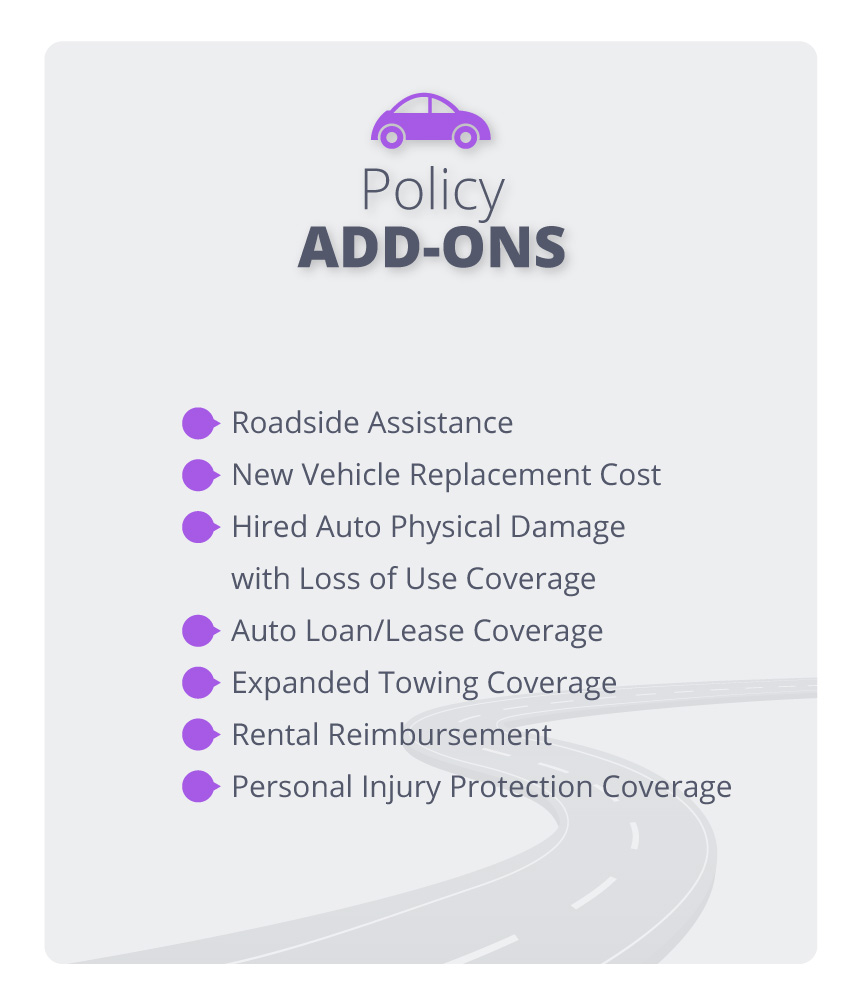
Commercial auto insurance in New Jersey
Commercial auto insurance covers legal fees and other expenses if a business-owned vehicle is involved in an accident. It's required for all commercial vehicles in New Jersey.
Who needs a commercial auto insurance policy in New Jersey?
Any New Jersey company that uses vehicles for business purposes must insure them appropriately.
Commercial auto insurance covers vehicles owned by your business. If your business-owned vehicle was involved in an accident, it would help pay for medical bills, legal fees, and other related expenses.
Any vehicles you own solely for work purposes must be covered by a commercial auto policy, whether you own a landscaping pickup, a tow truck, or a fleet of vehicles.
A business auto policy is more extensive than a standard commercial auto insurance policy. It covers all vehicles used by a business, whether they’re owned by the company, leased, or owned by employees.
What if I use my personal vehicle for work?
If you’re using your own vehicle for work-specific activities, your personal auto policy wouldn’t cover you in the case of an accident. That’s why many small business owners purchase hired and non-owned auto insurance (HNOA). This policy covers accidents involving personal, leased, and rented vehicles used for work purposes.
Your personal auto insurance policy covers you while driving to and from work, but not while making deliveries, picking up supplies, and other work-specific uses.
For example, if you or an employee gets into an accident while driving a personal car for a work errand or traveling to a job site, your HNOA coverage would help pay for any claims or lawsuits against your business.
It's worth noting that this type of insurance would not cover damage to the vehicle used by your business.
Why is commercial auto insurance important?
Without commercial auto insurance coverage, your business could be in legal and financial jeopardy. In New Jersey, all vehicles are required to carry auto liability insurance.
If one of your business vehicles is at fault in an accident, you could face an expensive lawsuit or settlement. You’d likely have to pay for damage to the other vehicle or property, medical costs, lost wages, pain and suffering, plus other related expenses.
Additionally, you could face severe penalties for not carrying auto insurance. Driving without insurance could result in fines and penalties, higher prices for new policies, and suspension or revocation of your driver's license or registration.

How does commercial vehicle insurance work in New Jersey?
All vehicles in the state of New Jersey are required to have auto liability insurance coverage, whether they’re for personal or business use.
New Jersey offers basic and standard auto insurance policies. The standard plan includes a minimum of:
- $25,000 per person bodily injury liability
- $50,000 per accident bodily injury liability
- $25,000 property damage liability per accident
- $15,000 personal injury protection (PIP)
Note that personal injury protection (PIP) insurance is required in New Jersey. This add-on coverage helps provide medical payments coverage after a car accident, regardless of who was at fault, and is mandated as part of the state's minimum vehicle insurance requirements.
Your insurance agency might recommend higher liability coverage limits based on the types of vehicles you own and how they’re used.
Semi-trucks, utility and cargo trailers, and other vehicles with a U.S. Department of Transportation of New Jersey serial number will have additional liability coverage requirements, depending on the kind of vehicle and how it’s used.
You can see if your business needs to meet these additional requirements by checking your USDOT number or docket number with the Federal Motor Carrier Safety Administration (FMCSA).
How much does commercial car insurance cost?

In New Jersey, commercial auto insurance costs an average of $263 per month, or $3,155 annually.
Your premium is based on several factors, including:
- Number of vehicles
- Type of business vehicle and value
- Level of risk involved
- Claims history
- Employee driving records
- Policy deductible and limits
- Location (e.g., Newark, Hoboken, etc.)
Verified business insurance reviews
Hear from customers like you who purchased small business insurance.
What else does commercial auto insurance cover?
While every New Jersey business owner must meet the minimum requirements for business auto insurance, this mandate only applies to liability coverage. This will protect you if one of your vehicles causes an accident, but it does have some exclusions.
It’s worth considering these other commercial auto coverage options to make sure you’re fully protected:
- Uninsured motorist coverage insures you against personal injuries and damage involving a company vehicle, in case whomever caused the accident is unable to cover the full cost of damages.
- Medical payments coverage pays for medical expenses if employees and passengers are injured in a company-owned vehicle, regardless of who is at fault.
- Collision coverage helps pay for the cost of repairing or replacing your company vehicle if it’s damaged in an accident, regardless of who was at fault.
- Comprehensive coverage covers the costs of non-collision damages such as vandalism, theft, flood, or fire.
- Towing and labor coverage covers the cost of roadside assistance for company-owned vehicles.
- Loading and unloading coverage insures against the damage of equipment and materials during transport, loading, or unloading.
- Bobtail coverage is recommended when you’re using tractors without a trailer. It usually covers the insured vehicle at all times, even during non-work-related uses.

Get free auto insurance quotes and buy online with Insureon
Insureon makes it easy for New Jersey business owners to get affordable commercial auto insurance. Complete Insureon’s easy online application today to compare insurance rates from top-rated U.S. carriers and car insurance companies. You can also consult with an insurance agent on your business insurance needs.
Once you find the right type of coverage for your small business, you can get a certificate of insurance in less than 24 hours.
